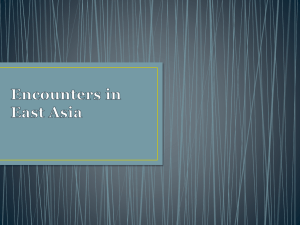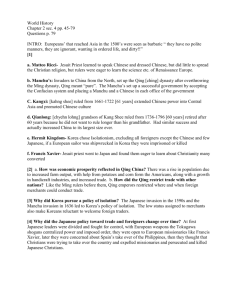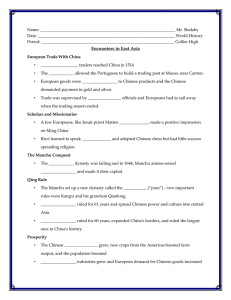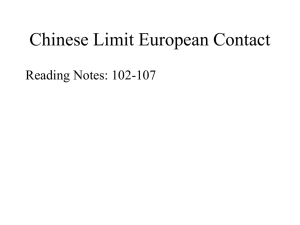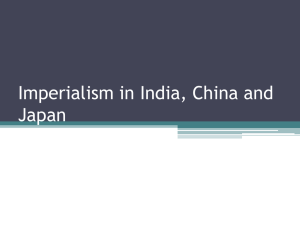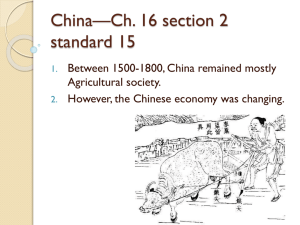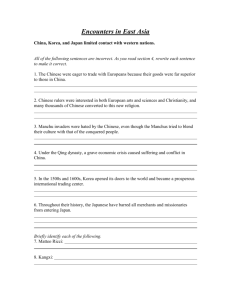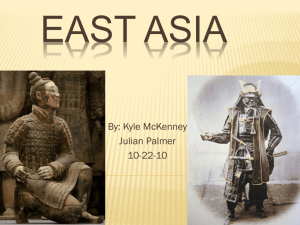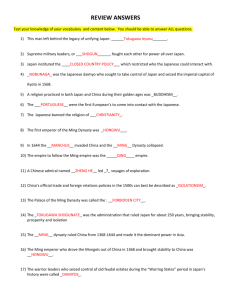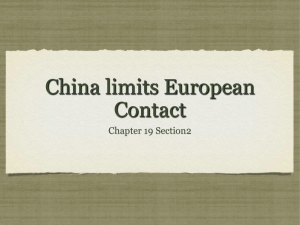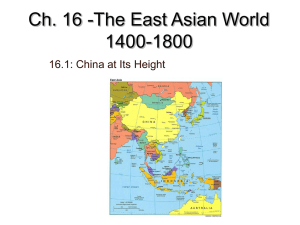World History
advertisement
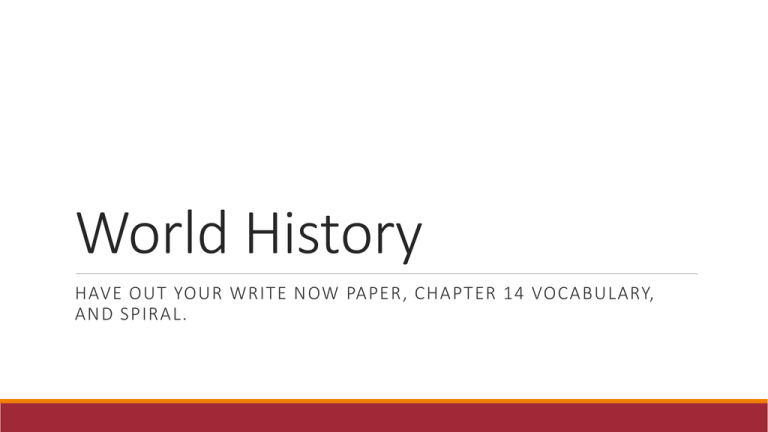
World History HAVE OUT YOUR WRITE NOW PAPER, CHAPTER 14 VOCABULARY, AND SPIRAL. Write Now Day 40: WN 8.4 Respond to the following in complete sentences in the space for class meeting 4 on your paper. 3 Tell me things you learned from your reading about European explorers in South and Southeast Asia . Table of Contents Spirals Reading Summary 14.4 Notes: East Asia Review Questions p. 282 #7-15 Unit 7: Global Age Why Explore? Chart Notes Reading Summary 14.1 Graphic Organizer 14.1 Notes: Exploration Hand drawn map notes Video Notes: Magellan (B2, G3) Notes: Exploration in Africa Summary 14.2 Graphic Organizer 14.2 Crash Course Questions (B2) Guided Reading 14.3 Reading Summary 14.4 Review Questions p.282 #7-15 Essential Question How were European encounters in East Asia shaped by the worldviews of both Europeans and Asians? Topical Questions • What happened with the European contacts with Ming China? • What was the Manchu conquest and how did it impact European trade? • What factors led to Korea isolating itself from other nations? • What was Japan’s attitude toward foreign trade and how did it change over time? Name Text Marking: Pair Read. Read aloud to each other. Under the main idea. Circle Vocabulary words. Annotate in the margin Class Date Portuguese traders reached China in 1514. They wanted Chinese silks and porcelains, but the European goods they brought to trade were not as fine as Chinese products. The Chinese, therefore, asked to be paid in gold or silver. The Ming rulers let the Portuguese and other Europeans set up a trading post at Macao, in present-day Guangzhou. Portuguese missionaries came with the traders. Later, Jesuits arrived, too. The Jesuit priest Matteo Ricci made a strong impression on the Chinese, who welcomed learning about Europe. Eventually, the Ming dynasty weakened. In 1644, the Manchus, a people from Manchuria, seized Beijing and made it their capital. They set up a new dynasty called the Qing. Two rulers oversaw the most brilliant age of the Qing—Kangxi and his grandson Qianlong. Under both emperors, the Chinese economy expanded. Internal trade grew. The Qing kept the Ming policy of restricting foreign traders, however. When Lord Macartney led a British diplomatic mission to China, his attempt to negotiate for expanded trade failed. Like China, Korea restricted contact with the outside world. In the 1590s, a Japanese invasion devastated Korea. Then in 1636, the Manchus conquered Korea. In response, Korea excluded all foreigners except the Chinese and a few Japanese. It became known as the “Hermit Kingdom.” The Japanese at first welcomed Westerners. Traders arrived in Japan at a time when warrior lords were struggling for power. The warrior lords quickly adopted Western firearms. Jesuit priests converted many Japanese to Christianity. The shoguns, or rulers, however, grew hostile toward foreigners. They worried that Japanese Christians owed their allegiance to missionaries and barred all European merchants. To learn about world events, however, they let one or two Dutch ships trade each year at a small island in Nagasaki harbor. Japan remained isolated for more than 200 years. Review Questions 1. How did the Ming learn about Europe? 2. Why did Korea become known as the “Hermit Kingdom”? 136 Write 1-2 words for each paragraph the key facts. Once you have read the summary and marked the text, answer the questions together. Vocabulary Practice Match the word to its definition. Turn the cards face down. Play “Memory” If time permits-play “Go Fish” Expansion in East Asia European interest in Asia grew, but the Ming emperors in China had no interest in foreigners. Eventually the Portuguese were permitted to trade in Macao. Supervised by imperial officials Had to leave at the end of trading season. Matteo Ricci arrived in 1583. Ricci translated books into Chinese. Much of what Europeans knew about China came from Ricci’s writings. Manchu Conquest 1644 Manchu invaded China. Took the capital. New Dynasty called the Qing Dynasty Qing Dynasty ◦Expanded the Chinese empire. ◦Population boom because of new crops. ◦Silk, cotton, porcelain industries expanded. Demand for goods increased. Trade increased. In 1793, British diplomat Lord Macartney sought greater trading rights. Qianlong rejected the British trade offer. Emperor Qianlong Korea Policy of Isolation Japan Unlike China or Korea, Japan at first welcomed foreigners. The Portuguese arrived in 1543, followed shortly by the British, Dutch, and Spanish. It was a time of disorder. Daimyo struggled for power Gained guns Won Isolation for Japan oJesuits came and converted Japanese to Christianity. oWorried about allegiance of converts. oExpelled foreign missionaries. oBarred European merchants. oLimited Japanese travel. oClosed off from the West. Independent Practice Reading Summary 14.4-Finish and put in your spiral Work on review questions p. 282 # 7-15. Complete Guided Reading and map from yesterday if not done.—DUE Friday or Monday Turn in your map when you are finished. Test Friday/Monday Chapter 14
